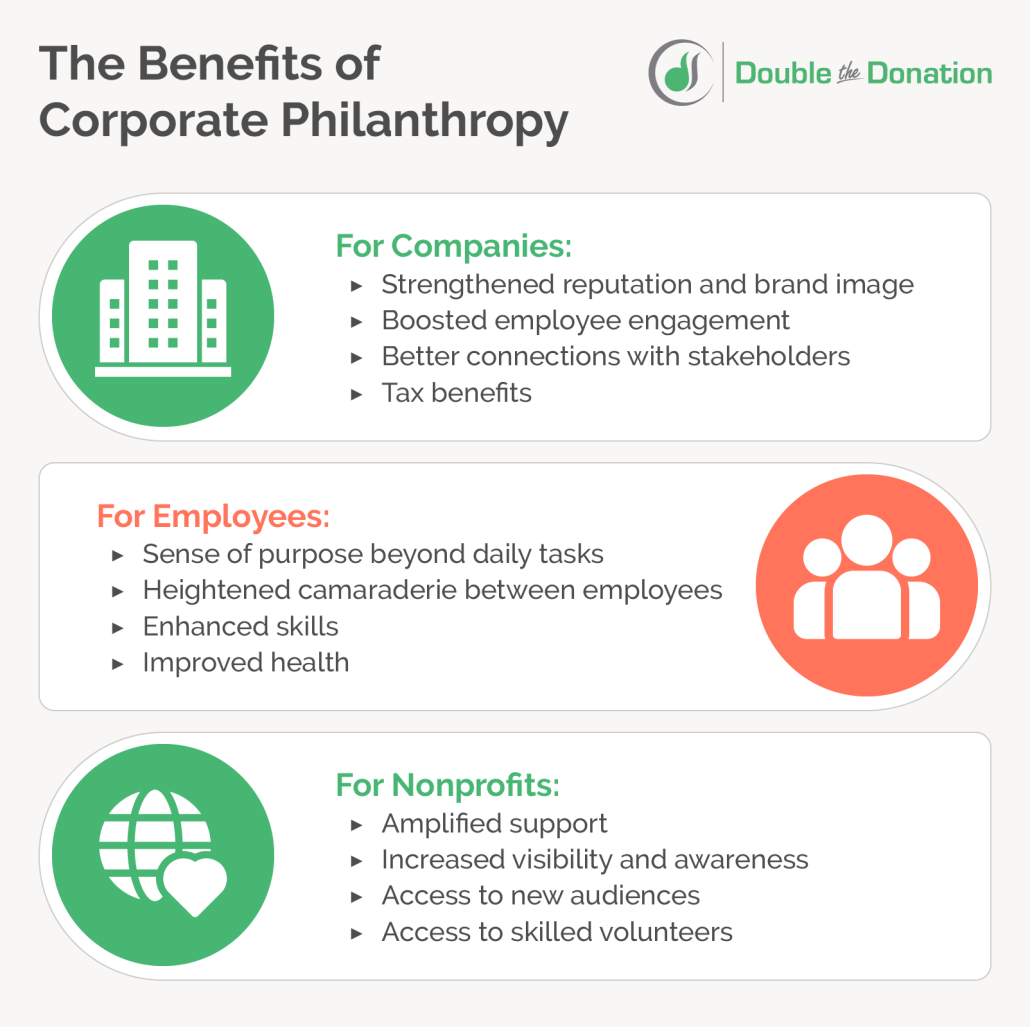Tracking ROI of your corporate philanthropy strategy
Why Company Philanthropy Matters: An Overview to Corporate Social Duty
Business philanthropy works as a crucial element of corporate social duty. It reflects a business's dedication to societal issues and improves its public photo. Businesses engaging in kind efforts commonly see boosted staff member morale and more powerful area ties. Nevertheless, the real impact of these efforts can be complex and complex. Understanding the subtleties of corporate philanthropy can illuminate its relevance in today's organization landscape. What are the vital variables that drive its success?
The Definition of Company Philanthropy
Corporate philanthropy refers to the charitable contributions and campaigns undertaken by companies to support social reasons and community growth. This concept encompasses a selection of activities, including financial donations, employee volunteer programs, and in-kind gifts of services or items. Companies participate in philanthropy to address social issues such as education, wellness treatment, ecological sustainability, and hardship relief.
Typically, business philanthropy is structured through formal programs or partnerships with not-for-profit companies, allowing businesses to leverage their sources efficiently. These campaigns typically aim to make a favorable influence on the area while lining up with the business's worths and goal. Furthermore, business philanthropy mirrors a dedication to corporate social obligation, showcasing just how businesses can contribute to culture beyond earnings generation. By taking part in philanthropic initiatives, firms can play a considerable role in cultivating social modification and addressing neighborhood demands.
Benefits of Business Philanthropy for Companies
Participating in company philanthropy offers various benefits for services, enhancing their reputation and fostering more powerful neighborhood connections. Companies that actively join humanitarian campaigns frequently experience raised employee spirits and loyalty. When staff members regard their company as socially responsible, they are most likely to feel happy with their office, resulting in greater degrees of work contentment and retention.
Furthermore, company philanthropy can produce useful networking opportunities. Teaming up with non-profits and community companies permits services to connect with like-minded people and teams, potentially leading to collaborations that can profit both parties. Additionally, companies involved in philanthropy may discover themselves extra enticing to stakeholders and capitalists that prioritize honest techniques.
Eventually, company philanthropy not just sustains social needs but also offers concrete benefits to services, creating a win-win situation that advertises development and sustainability while adding favorably to the globe.
Enhancing Brand Loyalty Through Social Obligation
Enhancing brand name loyalty with social obligation entails building depend on with customers by aligning corporate activities with neighborhood values (corporate philanthropy). Business can cultivate much deeper connections through neighborhood interaction initiatives that resonate with their target audience. Furthermore, authentic brand narration can additionally strengthen loyalty by showcasing genuine dedication to social reasons
Structure Depend On With Action
Building count on through activity is an effective approach that firms can apply to reinforce brand commitment and foster much deeper links with consumers. When businesses proactively take part in corporate philanthropy, they show a dedication to moral techniques and social duty. This positive method not only improves their track record but additionally reverberates with customers who focus on values placement. Openness in humanitarian initiatives is essential; business must effectively connect their initiatives and the effect they are making. Authenticity plays a substantial function as well; consumers are most likely to sustain brands that really respect social issues instead than those that take part in shallow marketing. Eventually, by prioritizing purposeful activities over mere words, firms can nurture enduring depend on and loyalty among their consumer base.
Community Engagement Efforts

Genuine Brand Narration
Community interaction campaigns often offer as a foundation for authentic brand name narration, which plays a substantial duty in growing brand name loyalty. By sharing genuine stories regarding their social obligation initiatives, companies can link psychologically with customers. These stories highlight the brand's worths, objective, and commitment to societal renovation, fostering trust and relatability. They are more most likely to develop a much deeper fondness and choice for it when customers regard a brand name as socially liable - corporate philanthropy. Genuine storytelling likewise motivates transparency, inviting customers to involve with the brand name on an individual level. Consequently, businesses not only improve their track record however also build long lasting relationships with their target market, eventually resulting in enhanced loyalty and campaigning for in an affordable market
The Role of Employees in Corporate Philanthropy
Staff members play a crucial function fit a company's philanthropic initiatives with their engagement and participation. Effective worker engagement approaches can improve volunteerism, resulting in meaningful neighborhood impact. As companies harness the cumulative power and passion of their workforce, they can cultivate click for info a culture of giving that extends past the workplace.
Employee Involvement Techniques
Involvement in corporate philanthropy fosters a feeling of function that expands beyond simple profit-making. Companies can boost employee participation Look At This by implementing different approaches that motivate engagement in philanthropic efforts. One effective strategy is to establish a matching present program, where the company matches staff member donations to eligible charities, magnifying their influence. Additionally, routine communication regarding kind efforts can produce recognition and inspire workers to add their time and resources. In addition, providing platforms for employees to share their philanthropic interests promotes a sense of ownership and neighborhood. Acknowledging and compensating workers for their humanitarian contributions can likewise strengthen a society of providing, eventually causing a much more engaged labor force straightened with the business's social responsibility objectives.
Volunteerism and Community Impact
Corporate philanthropy thrives when individuals proactively take part in volunteerism, straight affecting the neighborhoods they offer. Employee participation in volunteer campaigns not just improves business society however also fosters a sense of function and connection among personnel. Via offering, workers establish necessary abilities, such as synergy and management, which can equate into enhanced job efficiency. In addition, when workers unite for community causes, they reinforce their bond with the company, enhancing total morale and commitment. Organizations that motivate volunteerism commonly see a positive public picture, as neighborhood engagement mirrors their commitment to social obligation. Ultimately, the cumulative effect of employee volunteer initiatives can transform areas, addressing pushing social problems while reinforcing corporate worths and mission.

Determining the Impact of CSR Initiatives
As companies significantly purchase company social responsibility (CSR) initiatives, recognizing their impact becomes important for evaluating efficiency and guiding future efforts. Measuring the influence of CSR needs a multifaceted strategy, including both quantitative and qualitative metrics. Trick performance indications (KPIs) such as neighborhood engagement degrees, employee satisfaction, and ecological improvements provide useful insights right into the results of CSR programs. Surveys and meetings with stakeholders can disclose websites the social adjustment generated by these campaigns, while data evaluation helps track progression against set purposes.
Lining up CSR goals with organization objectives improves liability. Organizations can utilize structures such as the Worldwide Coverage Campaign or the UN Sustainable Development Goals to standardize their dimension processes. Inevitably, exact assessment of CSR initiatives not only shows a business's dedication to social responsibility but likewise informs method adjustments to maximize positive effect, cultivating a culture of sustainability and neighborhood interaction.
Best Practices for Applying Efficient CSR Methods
Applying reliable CSR strategies calls for a clear understanding of an organization's values and objectives, ensuring positioning with stakeholder expectations. Successful business begin by performing a comprehensive evaluation of their social, environmental, and economic influences, allowing them to identify areas for improvement. Stakeholder involvement is important; companies must actively include employees, clients, and neighborhood members in the development and execution of CSR campaigns.
Transparency is another ideal technique, as it promotes depend on and responsibility. Firms must interact their CSR objectives and progression honestly, sharing both successes and challenges. Furthermore, integrating CSR into the core business strategy boosts its effect, making it a fundamental part of procedures instead of an afterthought. Regular analysis and adjustment of CSR initiatives, informed by stakeholder responses and altering societal demands, warranty significance and effectiveness. By sticking to these methods, organizations can produce sustainable and purposeful CSR methods that reverberate with their neighborhoods.
Frequently Asked Concerns
How Can Local Business Take Part in Business Philanthropy?
Little services can join business philanthropy by giving away a portion of earnings, sponsoring regional occasions, partnering with nonprofits, using employee volunteer days, and taking part in community solution tasks, promoting a positive impact and boosting their brand online reputation.
What Prevail Misunderstandings About Company Philanthropy?
Typical false impressions about business philanthropy consist of the belief that it's only an advertising and marketing device, that just huge companies can take part, and that it does not have real impact. Numerous undervalue the value small companies can contribute with significant interaction.
Exactly How Do Customers Perceive Business Involved in Philanthropy?
Consumers commonly view business taken part in philanthropy positively, associating such initiatives with business obligation, ethical habits, and area assistance. This assumption can enhance brand name commitment, influence investing in choices, and enhance total corporate credibility in the market.
Exist Tax Benefits for Companies Involved in Philanthropy?
Businesses involved in philanthropy frequently delight in various tax obligation advantages, such as reductions for philanthropic contributions. corporate philanthropy. These incentives can boost a firm's monetary standing while promoting a favorable public image with their area involvement initiatives
Can Corporate Philanthropy Improve Employee Retention Fees?
Business philanthropy can improve worker retention prices by promoting a sense of objective and belonging among staff. Involved workers, aligned with firm values, are a lot more likely to continue to be completely satisfied and fully commited within their roles.
Company philanthropy serves as an essential part of corporate social responsibility. Company philanthropy refers to the charitable payments and initiatives undertaken by businesses to sustain social reasons and neighborhood growth. In addition, business philanthropy mirrors a commitment to corporate social responsibility, showcasing exactly how companies can add to society beyond earnings generation. Engaging in company philanthropy offers many advantages for companies, boosting their online reputation and fostering more powerful area ties. Consumers frequently watch companies engaged in philanthropy favorably, linking such efforts with company responsibility, ethical habits, and neighborhood support.